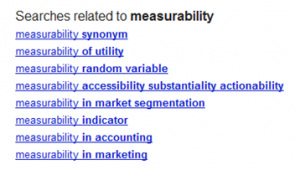On my LinkedIn profile, which is a little barren and has a goofy picture, one of the skills listed is procedural SEO ((search engine optimisation (or optimization) for those not familiar)). Now, there’s a massive amount of people who know SEO, spanning across all levels of knowledge.
As you may expect, procedural SEO has to do with process (a buzzword that I try in all circumstances to avoid in normal conversation). It’s optimisation of a process which inputs into the creation of positive search ranking factors.
An example:
A business is creating brochures for offline use. Introducing the process of adding this content to their website is procedural SEO. Taking something which was never intended for online use to create new search coverage, greater depth of content, opportunity to clarify a website’s main topic or offering.
Putting in place the process of using offline content on a website is not only SEO, it’s asset optimisation, getting greater return from the initial investment for creating the brochures. Sounding all a bit financial?
Interchangeability of expertise
Process optimisation is not limited to Search. Switch to any industry and merit emerges. Procedural design, medicine, wine tasting . As touched on in a previous post on collaboration being more important than data, if we connected these different skill-sets, outlooks, what could be achieved? Industries are at different levels of evolution. What processes could mining engineers (centuries old) bring to the table when collaborating with space travel? Or vice versa. Someone who has researched process optimisation, what great insights they could supply to this blog post? Staggering when you think about it. How far this internet lark (the concept) can go!
Why procedural SEO is important?
Myself, I don’t want to be underwhelmed. I don’t want to receive sub-standard when it matters. When I ask a sommelier which is the best wine on the menu? Firstly, I’d hope the first response would be “what do you like?”. After this please share your knowledge to empower my decision.
As close as possible to 100% comprehensive wine knowledge suits me. Which raises a question, with so many self-proclaimed experts around, what level of comprehension in a subject should one have to be considered an expert? Standardising expertise – interesting topic.
I know as much as I’ve learnt, I’ve seen, I can theorise and fathom. Beyond that – I don’t know. Perhaps that’s where you can help?


